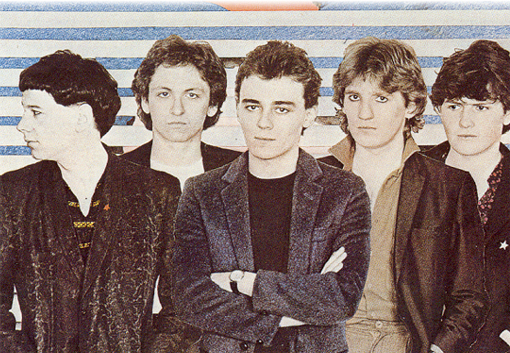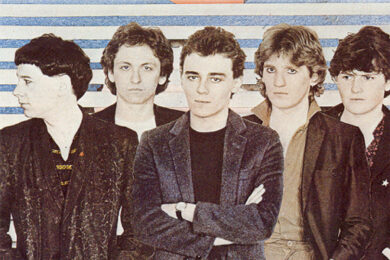For my thirteenth birthday my parents gave me a tape of Simple Minds’ second album Reel To Real Cacophony. Not out of some twisted desire on my parents’ part to educate my young ears into the ways of dark European post-punk (I’m sure they would claim no knowledge of such a thing), but because I’d asked for it. This was an early sign that I might be a completist when it came to buying music, that no record would be left behind. My first brush with the band had come when I borrowed Live In The City Of Light, a triumphant distillation of all their worst mid-80s stadium pop moves, from Milton Keynes Library (a library with an unparalleled music collection. I mean does your local library stock Polvo? I bet it doesn’t). And despite that record’s self-important sheen, there was something about it that was alluring, that seemed to invite me in. My brother was an ardent U2 fan at the time and I guess I was looking for something just for myself, a band that spoke for me, that could be my badge. In the wind-swept guitar of ‘Ghostdancing’, in the stuttering calm of ‘East At Easter’, the hopeful/hopeless grasp towards the light that is ‘New Gold Dream’, there warned of a band with vision, that resonated with my emerging curiosity about music. Even the stark black Malcolm Garrett-designed sleeve, where the band’s name was a logo in itself, said this was a band with identity, something you could belong to.
Reel To Real Cacophony though was an altogether more demanding listen and it took me a while to grasp it. Disillusioned with their own first record, 1979’s Life In A Day, the band had turned in on itself and decided to make a wilfully dark and obtuse record. Full of disconcerting moans, stabs of ominously echoing guitar, curt yelps and clipped, bass-heavy rhythm, it was an attempt by the band to find its own sound, and to confound. From ‘Citizen (Dance Of Youth)’s oppressive police state imagery ("You’re cutting up our friends, making love to our sisters") to the dense synthesisers on ‘Factory’, the record felt heavy, monochromatic and uneasy. But it was intensely influential on the teenage me, years before I discovered Joy Division and The Holy Bible, proving just how close to the bone guitar music could get, how graphically it could warn of the world outside, and how stark and powerful a bass-line stapled leanly to a drum-beat could be.
Still further pleasures were to await as I delved into the rest of Simple Minds’ back catalogue. What could be more neck-tingling than the strident bass-line that announces the beginning of ‘As Trance As Mission’ on 81’s Sons And Fascination? Derek Forbes, along with Adamson, Wobble and Hook, was in the premier league of post-punk bassists, and was one of the reasons I picked up a bass myself. Forbes was as apt at the slap-friendly playing that became de rigeur around 81/82 as any of the smug twiddlers of white new-romance funk were, but his bass lines came from the punk end of post-punk: melodic and heavy rather than extravagant. He never strayed far from the Fender Precision at a time when John Taylor’s idiotic Aria Pro II guitar was turning strung-high cocktail bass-playing into the 80s thing, and fretless basses, the Dead Kennedys vision of "ethnicky jazz" made flesh, were and always will be abominable. Forbes and the Minds’ first drummer, Brian McGee, were the quintessence of no-nonsense working class rhythm section: in their hands, post-punk was able to become a genuine change of the guard, while their peers wandered up a cul-de-sac of yawn-inspiring noodling. Listen to ‘I Travel’, to ‘Premonition’, to ‘Sweat In Bullet’, to ‘Theme From Great Cities’, to ‘Cacophony’ and you will hear the best bass-playing of the early 80s full-stop.
But I digress. What Simple Minds had, from those early Magazine-inspired records, arguably into the front end of what became their 80s stadium pomp (I still care about a chunk of Sparkle In The Rain, especially ‘Book Of Brilliant Things’, where the lyric-writing was just turning towards the fantastic, if kind of empty, but still retained a hint of wonder), was that working-class identity made big, that dare-to-dream mentality made accessible.
These were kids from the Barras who had the balls to put on eye-makeup, to channel Dave Vanian, Eno and Neu! and challenge the idea that the 80s signalled a brave new world of elegance and sophistication. Those early records still have the power to creep inside. Empires And Dance is a record that paints a sobering, motion-sick picture of Eighties Europe: "Ideal homes falling down/Europe has a language problem…". Jim Kerr, who’d grown up with a stutter, had the eye and the voice of the outsider, seeing the London music industry and the machinations of old-world power as one and the same thing.
Yeah, in the end he tried to cop Bono’s moves and looked like a tit when he slid around a stage like a Vegas magician. But across the first four or five records you can hear him lost in thought, looking wide-eyed at a troubled world and conjuring up the most vivid scenery. ‘King Is White And In The Crowd’ from New Gold Dream was Kerr’s fascinated take on the Sadat assassination in 1981. "Youth’s dance proud from the waist down… a rhapsody in black and blue". His was a voice from the new age of television news, slick fashion magazines and Thatcherism, but there was a note of doubt in there, like he was peering behind the facade.
So I signed up, and Simple Minds became my band between the years of 13 and 16, at which point Suede and the Manics came along and the stuff that Kerr and his peers started to represent in the 90s just collapsed around my ears. It couldn’t last because to ignore the musical movements that were actually happening around me (riot grrrl, androgyny-rock, DIY) and stick with this safe, adult rock, would have been betraying what even Kerr himself held dear back in ’79. There was a real change in the air, and I had bands to watch and be inspired by and interact with. But a part of my heart will always belong to the wonder and danger of Simple Minds. For me, they opened a door into the darkness.



